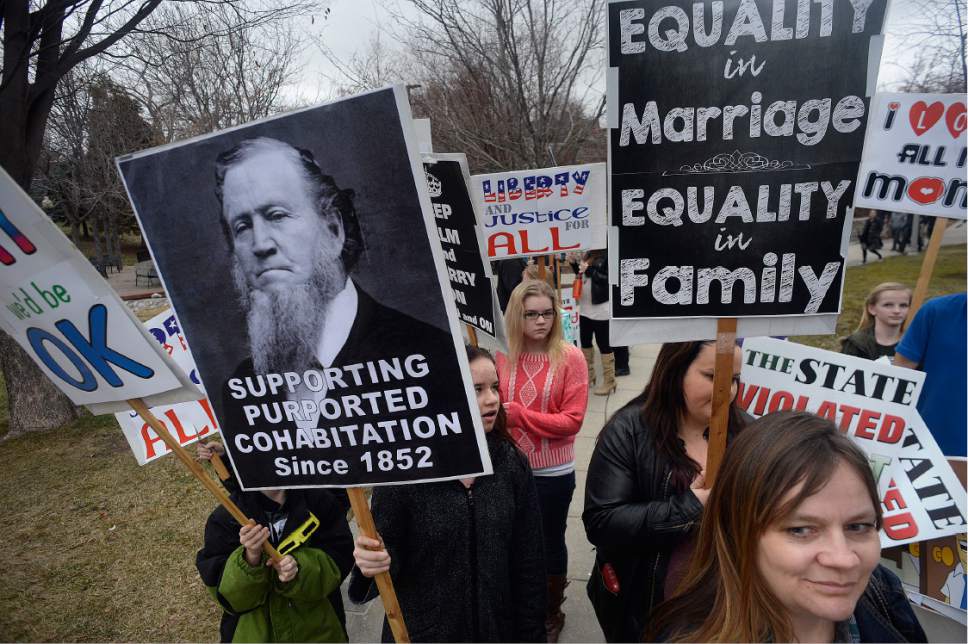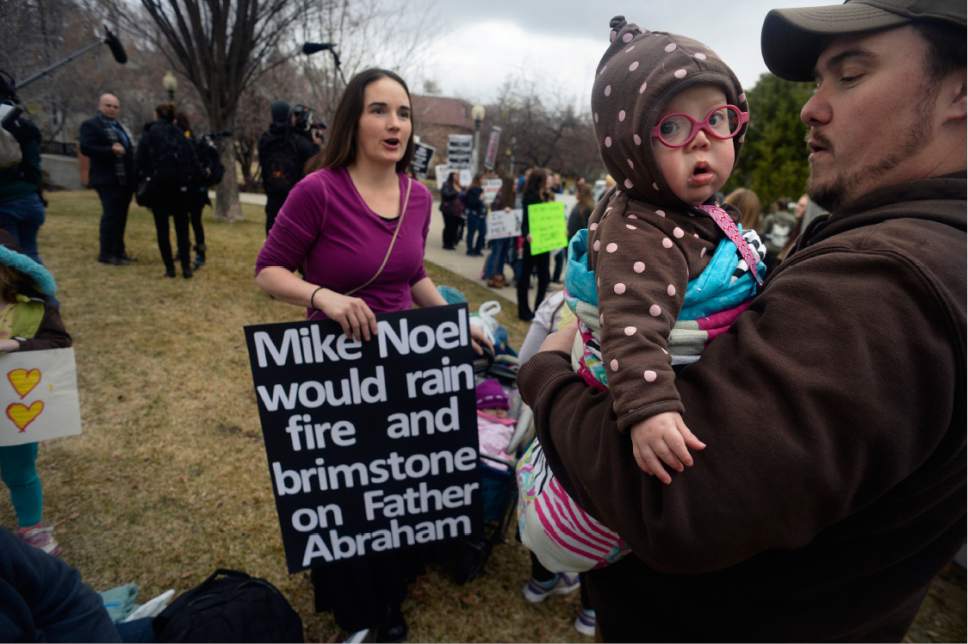This is an archived article that was published on sltrib.com in 2017, and information in the article may be outdated. It is provided only for personal research purposes and may not be reprinted.
Any day, Utah Gov. Gary Herbert will decide whether to sign or veto HB99, the bill which amends the definition of bigamy in Utah and increases the penalties for it some cases.
Here are some questions and answers.
• What does HB99 say? The bill adds criteria for being prosecuted for bigamy: The offender would have to live with the extra spouse and "purport" to be married. Current state law requires only one or the other.
HB99 would keep the offense a third-degree felony punishable by up to five years in prison, but the penalty could increase to 15 years if bigamy is prosecuted in conjunction with crimes such as abuse, fraud or human smuggling. Anyone leaving a polygamous marriage and reporting abuse or protecting a child would receive amnesty.
• Isn't polygamy illegal in Utah already? Yes. A clause in the Utah Constitution prohibits polygamy, Utah's civil statutes don't recognize it and no one can go to their county clerk and ask for multiple marriage licenses.
But there is a question as to whether polygamists can be prosecuted for bigamy — the crime of marrying one person while already being married to someone else.
The Brown family from the television show "Sister Wives" sued the state after Lehi police investigated them for bigamy. A federal judge in Salt Lake City ruled for the Browns in 2013, saying Utah's bigamy statute, as applied to polygamists, is unconstitutional. Judge Clark Waddoups said the state could show no public interest in broad language that lumps cohabitation into the category of bigamy and the law was applied unevenly over the decades. Utah used it to prosecute people subscribing to early Mormon teachings and who were public about it, rather than investigating anyone suspected of breaking the statute, he said.
Rep. Mike Noel, R-Kanab, the bill's sponsor, as well as the Utah Attorney General's Office, thinks adding the second criteria to the bigamy definition will satisfy Waddoups' concerns. Noel also contends that the prohibitive clause in the state constitution requires that Utah keep polygamy a crime.
• Wait. Didn't the "Sister Wives" lose? They did. Here's where things get tricky.
The 10th Circuit Court of Appeals overturned Waddoups' ruling on the grounds the Browns were never prosecuted. The U.S. Supreme Court declined to hear the case.
However, both polygamists and people opposed to polygamy seem to think Waddoup's legal analysis, though not binding, is accurate.
• If the bill is signed, will prosecutors start charging polygamists? Probably not for polygamy alone.
If the bill is signed, any prosecutor charging consenting adults only with bigamy can expect the same lawsuit the Browns filed, and this time the family will have standing the standing that the Browns did not. The plaintiffs might also be able to enter into evidence Noel's statements criticizing polygamists who call themselves fundamentalist Mormons.
Joe Darger, who has three wives, has even dared prosecutors to charge him.
What do lawyers say about the constitutionality of this bill? Sean Reyes says this helps him. Will he use it to prosecute? (We dare him?) https://t.co/hKMkVQwGRD
— TheDargerFamily (@TheDargerFamily) March 20, 2017
The Utah Attorney General's Office, as well as any county attorney ever asked, has said its policy is to not prosecute consenting adults whose only crime is bigamy — their real concerns is polygamists who commit fraud and abuse. That's the rationale for part of the bill that increases the penalties for polygamists who commit those other offenses.
Polygamists, however, aren't so sure consenting adults won't be prosecuted one day. There's also concern that more innocuous behaviors by polygamists can be used to prosecute them with the enhanced penalties and as a way to avoid a "Sister Wives" lawsuit.
The plural wives who visited Sen. Jim Dabakis, D-Salt Lake City, for example, pointed out that they routinely fill out government forms and report themselves as not married since their marriages are only spiritual and not on file with any county clerk. If a prosecutor wants to contend the plural wife is committing fraud when she marks herself as not married, the polygamists' argument goes, the prosecutor has a defense against a "Sister Wives" lawsuit and the wife could face 15 years in prison.
Douglas White, a private-practice attorney who testified in favor of HB99 and who has said Waddoups' ruling was all wrong, contends the plural wives are making a false argument since no woman has ever been prosecuted for bigamy over checking a box.
White, however, favors prosecuting the consenting, adult polygamists. He contends that would help eliminate frauds and abuses committed within polygamous groups.
• Doesn't Utah already have laws against fraud and abuse? Yes, and that has been a major argument by polygamists and people opposed to the bill, including the legislators who voted against it.
Noel and Parker Douglas, the assistant Utah Attorney General who testified in favor of the bill, have said fraud and abuses in polygamy are unique offenses in that marriage and families are used as underpinnings to facilitate the crimes.
• If the bill is signed, can I still have an orgy? As long as you're not married to two or more participants, yes. This issue came up at one of the House Judiciary hearings for HB99, and it has become another argument against the bill.
Opponents say the state is seeking to make what polygamists do a crime, but it is legal if you do not "purport" to be married.
• Who supports and who opposes the bill? Besides those people already mentioned, the bill has the support of anti-polygamy organizations as well as a few former plural wives and children of polygamists who contend they lived in households that were abusive and polygamy was to blame. The women from another reality show, "Escaping Polygamy," have testified and rallied in favor of HB99. Some lawyers who have represented people leaving polygamous homes support the bill, too.
The Church of Jesus Christ of Latter-day Saints, which officially abandoned polygamy in 1890 and excommunicates members found practicing it, also issued a statement supportive of HB99.
"The practice of polygamy remains strictly prohibited in The Church of Jesus Christ of Latter-day Saints," the statement reads. "When it comes to laws governing polygamy, the church's primary interest is in looking after potential victims of such associations.
"The church is concerned that reducing the perceived seriousness of this criminal activity sends the message that such abuses are not serious criminal offenses."
Opponents of the bill include polygamists and a few former plural wives who contend any abuse in polygamous households are the result of individuals rather than plural marriage itself.
The Libertas Institute, a libertarian think tank in Lehi, opposes the bill on civil rights grounds. Jenn Oxborrow, the executive director of the Utah Domestic Violence Coalition testified against HB99. Even with the amnesty clause, she worries the bill will discourage women from reporting abuse.
Ken Driggs, a semi-retired attorney in Atlanta who has studied polygamy and the law, sent Herbert a 16-page memo urging a veto. Driggs contends HB99 is still unconstitutional.
• Didn't the gay marriage cases settle this? No. A lot of people assume polygamy is the next battle in marriage equality, but for now, there is no case law upholding one's right to marry multiple people.
• What do the laws in other states say? The statues vary, but most states define bigamy in terms of someone having multiple marriage licenses. That's why the Browns, for example, moved to Nevada and have been living there without fear of prosecution.
• If the bill is signed, will it deter polygamy in Utah? That's the hope of many bill supporters. Maybe someone will think twice before converting to polygamy, but, as Meri Brown of "Sister Wives" recently pointed out, a lot of polygamists practice plural marriage because it's part of their religion.
For that matter, polygamy has been against Utah law —to varying extents — since statehood. The practice has persisted.
ncarlisle@sltrib.com
Twitter: @natecarlisle





